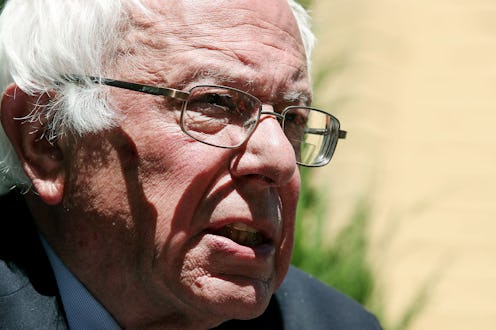News
Bernie Sanders Didn't Win Big In The D.C. Primary
The primary season is officially over (yes, really) and the pledged delegate totals are finalized. After last week's six Democratic primaries, including delegate behemoth California, it became clear that Hillary Clinton would win the delegate race, both pledged and unpledged. Yet, still her second-place opponent Bernie Sanders has yet to concede. And now, his less-than-stellar performance in the D.C. primary should increase the pressure even further to get out of the race. But since the primary's all about delegates, how many delegates did Sanders win in Washington, D.C.?
Not very many. Now that 100 percent of the vote is counted, the Associated Press called the race for Clinton, giving her the majority of the District of Columbia's 20 pledged delegates. Sanders took home just four delegates, according to The New York Times' delegate count. The official tally put Clinton ahead by about 55,000 votes, which means, percentage-wise, that Sanders was significantly behind. He took home just 21 percent of the vote compared with Clinton's 79 percent.
Clinton was expected to do well in the nation's capital, in part because the city's population is about half African American. In past contests, African American voters have supported Clinton, not Sanders; she has done well in other states with large black populations, including D.C.'s neighboring state Maryland. As Nate Silver of FiveThirtyEight put it, Clinton does better in states (and territories) that look more like the Democratic Party — in other words, places that are more diverse. D.C. is just under 36 percent non-Hispanic white compared with 62 percent nationwide.
Sanders also appeals to political independents and those who resent Washington, but why would they settle in the home of our nation's hyper partisan politics? It's hard to measure those in support of political outsiders, but just under 17 percent of D.C.'s registered voters are unaffiliated, or registered with "no party," as the lingo goes in D.C. (For comparison, unaffiliated voters account for about 39 percent of voters nationwide.) Plus, the D.C. "no party" voters couldn't vote for Sanders if they wanted to; the District has a closed primary.
In addition to the 20 pledged delegates, D.C. is home to 26 superdelegates; Sanders has won the support of just two. Clinton counted 23 among her supporters and there is one remaining superdelegate that is still undecided. Counting superdelegates, Clinton is ahead with 2,800 delegates compared to Sanders' 1,88, according to the Associated Press.
Despite Clinton's insurmountable lead, Sanders may stay in the race until the convention in Philadelphia in July, according to his spokesman. That was, however, before Sanders met with Clinton Tuesday night, so things could still change. Sanders plans to address his supporters via a live video stream on Thursday, June 16. Either way, Clinton has, without a doubt, won. So take a deep breath, because the primaries are finally over.
